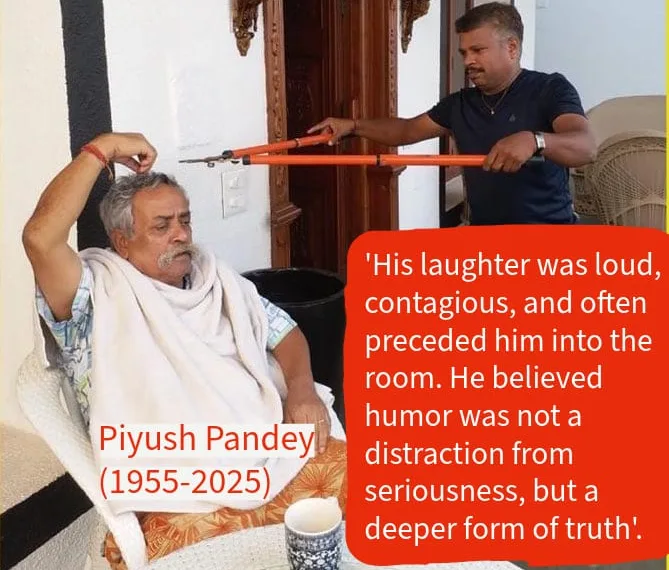Piyush Pandey (1955–2025)
He didn’t just sell products. He sold India to itself—with humor, heart, and a moustache that became a national logo.
On October 24, 2025, the Indian advertising world lost its brightest jewel. Piyush Pandey, the man who turned everyday brands into cultural icons, passed away at the age of 70. His legacy is etched not just in awards and campaigns, but in the emotional vocabulary of a billion Indians.
The Mind Behind the Memory
Born in Jaipur, Pandey’s journey was anything but linear. Before joining Ogilvy & Mather India in 1982, he dabbled in cricket, tea tasting, and lent his voice to radio jingles alongside his brother Prasoon Pandey. But it was at Ogilvy that he found his true calling transforming advertising into storytelling rooted in Indian emotion, humor, and everyday life.
Under his leadership, Ogilvy India became the most revered creative agency in the country. He rose to become Executive Chairman (India & South Asia) and Global Chief Creative Officer a rare feat for any Indian adman.
A Trophy Cabinet That Told Stories
Piyush Pandey’s work was celebrated across continents, earning him some of the most prestigious honours in advertising and public life:
• Padma Shri (2016) – One of India’s highest civilian honors, awarded for his transformative contribution to advertising.
• LIA Legend Award (2024) – Recognized by the London International Awards for lifetime excellence in creativity.
• Asian Advertising Hall of Fame (2011)– Honoured for pioneering culturally rooted storytelling in Indian advertising.
• Clio Lifetime Achievement Award (2012) – For campaigns that blended Indian ethos with global appeal.
• Cannes Lions “Lion of St. Mark” (2018) – Awarded jointly with his brother Prasoon Pandey for lifetime achievement
* Lifetime Achievement Award by AAAI (Advertising Agencies Association of India) – For reshaping the Indian advertising landscape.
Campaigns That Became Collective Memory
Pandey’s genius lay in turning brands into emotional experiences:
• Fevicol’s “Zor Ka Jhatka” and “Egg” ads – Comedy rooted in Indian jugaad.
• Cadbury Dairy Milk’s “Kuch Khaas Hai” – A celebration of joy and indulgence.
• Asian Paints’ “Har Ghar Kuch Kehta Hai” – Homes as storytellers.
• Hutch’s “You & I” (the pug ad) – Minimalism with emotional punch.
• Vodafone’s ZooZoos : Whimsical white aliens that redefined brand recall through pure visual storytelling.
• “Mile Sur Mera Tumhara” – A national integration anthem that still gives goosebumps.
* “Abki Baar Modi Sarkar” – A political slogan that became a national chant at the 2014 Lok Sabha election campaign.
The Humor That Made India Smile
Pandey’s humor wasn’t just a creative tool it was a cultural compass. He had an uncanny ability to spot the absurdities of everyday Indian life and turn them into unforgettable punchlines. Whether it was a buffalo stuck in traffic or a wedding guest glued to a Fevicol bench, his ads didn’t mock—they celebrated.
His laughter was loud, contagious, and often preceded him into a room. He believed that humor was not a distraction from seriousness, but a deeper form of truth. That’s why his campaigns never felt like ads—they felt like inside jokes shared across generations.
“If you can make someone smile, you’ve already opened the door to their heart—and their wallet.” Piyush Pandey
The Man Behind the Moustache
Beyond the boardroom, Pandey was a man of quirks and warmth:
• His famous paan habit—a red-stained smile that became his signature.
• His booming laughter, often heard before he entered a room.
• His iconic dialogues, like “Don’t sell the product, sell the emotion,” which became gospel for ad students.
• His moustache, as expressive as his copy.
He was a storyteller, a mentor, and a man who could turn a tea break into a masterclass on branding.
A Personal Tribute
I have been fortunate—not just to admire his work from afar, but to meet him in person and interview him during my time at exchange4media in the late 2000s. He was generous with his insights, mischievous with his metaphors, and deeply committed to the idea that advertising must serve the soul of a nation, not just its market.
A Quote That Endures:
“The best advertising is that which builds brands over time, not just sells products overnight.” Piyush Pandey
This wasn’t just a philosophy it was a promise. One he kept with every campaign, every jingle, every punchline.
“He didn’t just write copy, he wrote culture.
He didn’t just sell brands, he sold belonging.
With a paan-stained smile and a moustache that spoke before he did,
He taught India to laugh at its quirks, to cherish its chaos, to find dignity in the everyday.
From “Mile Sur” to Fevicol, he stitched our cultural mosaics into campaigns—
And made every home, every street, every chai tapri feel seen.
I met him once, in the late 2000s, when I was still learning the ropes at exchange4media.
He didn’t give answers. He gave metaphors. He didn’t preach. He provoked.
He didn’t exit the stage—he became the script.
Etched in every jingle, every smile, every home that still hums his lines.”
The Legacy Lives On
Piyush Pandey didn’t just build brands. He built emotional infrastructure. He gave Indian creatives the confidence to speak in their own voice, and gave audiences the joy of seeing themselves reflected with dignity and wit.
“Such men don’t die. They become metaphors—living forever in the laughter they sparked, the wisdom they shared, and the work that made a nation feel seen.”

